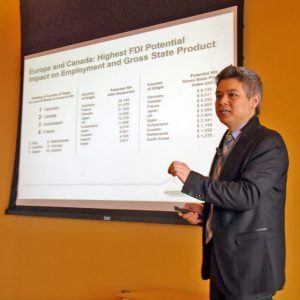by Chen Wu, Plymouth State Associate Professor of Economics; Director of Graduate Programs, School of Business
Plymouth State recently held a brainstorming session for faculty and staff focused on economic sustainability. I was in a group with my colleague, Chen Wu, and he offered some helpful background theory from his field that was a productive guide for our conversations. I asked him to share it here in case others also find it useful. –Robin DeRosa, Open CoLab Director
On the Opportunities to Invest in Future Growth

Development Economics is a sub-field of Economics which aims to reduce poverty through the growth of economies. Models in Development Economics highlight three significant contributing factors for the growth of an economy, namely Labor, Capital, and Productivity. Labor refers to all human actions in the production process. Capital means all human made aids to production, and Productivity is measured by the output per labor hour. If we think of a university as an economy and apply the above model to explain its growth, then examples of some (NOT ALL) significant factors would include:
- Labor growth via (1) offering more professional development opportunities for faculty, staff and even students, (2) strategically hire or reallocate lines of faculty and staff resources, etc.
- A more efficient use of the existing physical capital via (1) a contractionary approach on the purchase of new furniture and office supplies given the extensive campus Inventory free to all departments, (2) an expansionary approach on the underused facility by offering more events on campus such as professional conferences, and summer programs for high/middle school students and international students, etc.
- Productivity growth via (1) cultivating a holistic and collaborative organizational culture, (2) maintaining a viable operational and administrative model, and (3) facilitating effective interdepartmental communications that prevent frictional and/or repetitive efforts.


